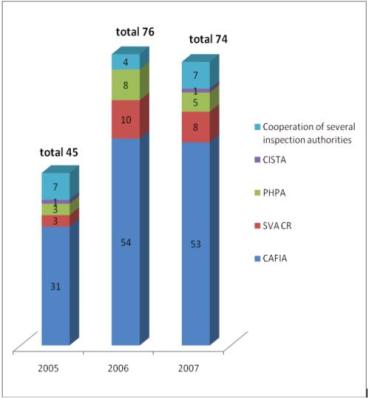What to do when an inspection authority reveals that a Czech company is distributing a dangerous food abroad? Where shall the authority find specific information when scaremongering concerning Italian production and distribution of the so-called recycled cheese is going on? This is exactly the situation when the EU Rapid Alert System for Food and Feed (RASFF) is to be used. In this system, centrally managed by the European Commission, all the EU Member States are engaged.
By means of RASFF Member States warn each other against dangerous food and feed, possibly against products not suitable for human consumption, in the form of the so-called alert. Each case is sent to the competent inspection authority in the member state concerned, the authority is then responsible to inspect it. Namely it has to be found out if and where the food was distributed. The control results are subsequently transformed into the so-called additional information which is again loaded into the system. For example in case of the guar gum from India contaminated by dioxins one original alert was sent out and then followed by 135 additional ones. In 2007 the EU dealt with almost 3.000 cases, however, in total more than 7.000 alerts were spread by the system.
Czech Agriculture and Food Inspection Authority is not only one of the RASFF members in the Czech Republic, but also a National Contact Point ensuring the exchange of alerts between the Czech Republic and the European Commission. The National Contact Point workers register in unceasing standby service all the alerts concerning Czech Republic. Last year 76 original alerts were accepted and 74 sent off by the National Contact Point. The sent-off alerts were mainly submitted by the Czech Agriculture and Food Inspection Authority which announced 53 cases in its competence and cooperated on other five with another inspection authority, e. g. with the State Veterinary Administration or Customs Administration of the Czech Republic.
The sent-off alerts concerned mainly processed fruits and vegetables; several cases of dried apricots and dates with pests were detected or two cases of candied pears from China with a high content of sulphur dioxide. Several times the Czech Republic also informed about dried shell fruits (almonds, pistachios) with excessive content of aflatoxins. For the same reason a delivery of Vietnamese peanuts and almonds from the U. S. were refused on the frontier. Four alerts warned against food supplements on the stimulation of sexual activity containing analogues of healing substances which are not allowed for food. In many cases the alerts of the State Veterinary Administration concerned fish products containing Listeria monocytogenes bacteria or higher amount of polyphosphate. Public Health Protection Authorities announced then among others cases of packaging materials which released dangerous chemicals into foodstuffs.
The Czech Republic has been a legitimate RASFF net member since its EU accession in May 2004. It sent 44 alerts in the first year of the system functioning; however last two years its number reached more than 70. “It is good news for our consumers; total numbers prove that they are very well protected thanks to the RASFF system,” commented Jakub Šebesta, CAFIA Director General, the numbers. “I also very much appreciate the positive evaluation of the CAFIA activities which was delivered from the European Commission. Such praise is the best argument against all those who doubted RASFF functioning in the Czech Republic in the past.”
Announcements sent by the RASFF system in the period 2005 to 2007 (according to inspection authorities)
Czech Agriculture and Food Inspection Authority (CAFIA) – predominantly foodstuffs of non-animal origin
State Veterinary Administration of the Czech Republic (SVA CR) – foodstuffs of the animal origin
Central Institute for Supervising and Testing in Agriculture (CISTA) – feed
Public Health Protection Authorities (PHPA) – materials coming into contact with foodstuffs

Author:
Mgr. Martina Šmídtová
- CAFIA spokesperson, phone : +420-542426633
 szpi.gov.cz
szpi.gov.cz